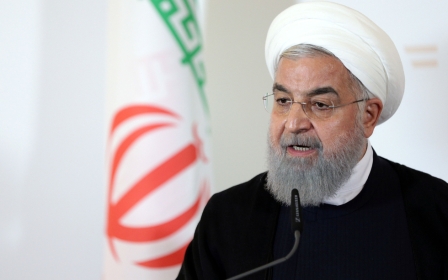Trump plan to send 1,500 additional troops to Middle East 'dangerous' says Iran

Iranian Foreign Minister Mohammad Javad Zarif said on Saturday that the US decision to deploy more troops to the Middle East in response to a perceived threat from Iran was "extremely dangerous" for peace.
The United States said it was sending 1,500 troops to the region in what it called an effort to bolster defences against Tehran, while also accusing Iran's Revolutionary Guards of direct responsibility for attacks on tankers earlier this month.
"The Americans have made such allegations to justify their hostile policies and to raise tensions in the Persian Gulf," Zarif told state news agency IRNA.
"Increased US presence in our region is extremely dangerous and it threatens international peace and security, and this should be addressed," he said.
US President Donald Trump also invoked the threat from Iran to declare a national security-related emergency that would clear the way for the sale of billions of dollars’ worth of weapons to Saudi Arabia, the United Arab Emirates and other countries without congressional approval.
"We want to have protection in the Middle East. We're going to be sending a relatively small number of troops, mostly protective," Trump said on Thursday, as reported by Reuters news agency.
On Thursday morning, US Defense Secretary Patrick Shanahan said that the troop deployment would serve a defensive purpose.
"Our job is deterrence. This is not about war," he told reporters in Washington.
The Pentagon did not specify where the new troops would be deployed in the region, but it said that they will not be stationed in Iraq or Syria.
The announcement follows weeks of tensions and threats between Tehran and Washington.
"America... is sending two warships to the region. If they commit the slightest stupidity, we will send these ships to the bottom of the sea along with their crew and planes using two missiles or two new secret weapons," General Morteza Qorbani, an adviser to Iran's military command, was quoted by the semi-official news agency Mizan on Saturday.
The US actions were the latest by the Trump administration as it highlights what it sees as a threat of potential attack by Iran, and follows decisions to speed the deployment of an aircraft carrier strike group as well as send bombers and additional Patriot missiles to the Middle East.
Western experts say Iran often exaggerates its weapons capabilities, although there are concerns about its missile programme and particularly its long-range ballistic missiles.
US officials, citing intelligence reports, said in early May that Iran may be planning attacks on American troops in the Middle East.
US National Security Adviser John Bolton then announced that Washington was deploying a naval strike group to the Gulf to send a "clear and unmistakable message to the Iranian regime".
The following week, four ships were "sabotaged" off the coast of the United Arab Emirates.
Although details of the alleged sabotage remain hazy and Tehran has denied responsibility, media outlets cited anonymous US officials linking Iran to the attacks.
For the first time since the incident, the Pentagon on Thursday publicly accused Iran of using naval mines to target the ships.
Michael Gidlay, director of the Pentagon's joint staff, also inferred that Iran was behind a recent rocket attack near the US embassy in Baghdad. "We view this as a campaign," said Gilday, as reported by AFP news agency.
A previously unknown Iraqi group took responsibility for that attack, saying it was an act of retribution for Trump's decision to pardon a US soldier convicted of killing a bound Iraqi detainee in 2009.
'Trump has ZERO plan'
Earlier this month, a Saudi newspaper called for military strikes against Iran, after Riyadh accused Tehran of carrying out a drone attack on an oil pipeline in the kingdom.
Still, Trump has called on Iranian leaders to negotiate directly with him, as officials in Tehran repeatedly warned against war.
This round of escalation comes a year after Trump pulled Washington out of a multinational deal that saw Tehran drastically scale back its nuclear programme in exchange for the lifting of economic sanctions.
The president also designated Iran's Islamic Revolutionary Guard Corps as a terrorist group earlier this year and reimposed a series of sanctions on key sectors of the Iranian economy.
US lawmakers, particularly Democrats, have questioned Trump's Iran strategy, pushing to remove his authority to go to war without congressional approval.
On Thursday, Democratic Senator Chris Murphy was quick to raise concerns about the deployment of additional troops to the Middle East.
"More tactics with absolutely no strategy. What are we trying to get the Iranians to do? Back down? Negotiate? All that is happening now is escalatory move after escalatory move," Murphy wrote on Twitter.
"Trump has ZERO plan for how this ends, and that should scare the hell out of everyone."
Middle East Eye delivers independent and unrivalled coverage and analysis of the Middle East, North Africa and beyond. To learn more about republishing this content and the associated fees, please fill out this form. More about MEE can be found here.







